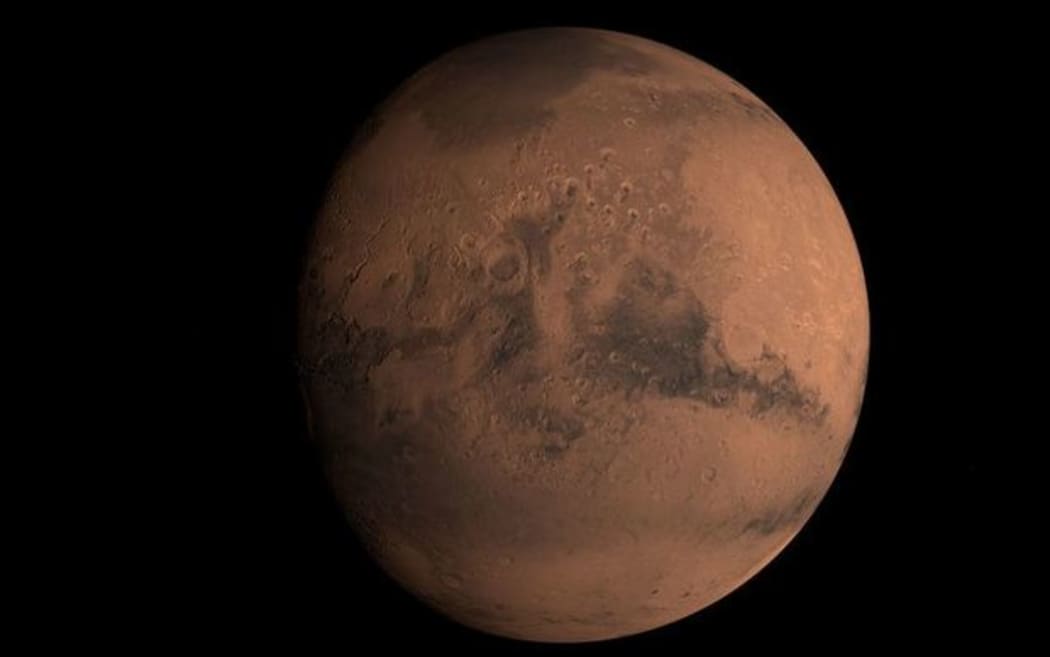SpaceX has successfully test fired a rocket which could take humans to Mars. We're not there yet but the day we set foot on the Red Planet is inching closer, and private companies have it in their sights.
So what happens when the Elon Musk's of the world start colonising Mars? Can they? These are the questions Dr Anna Marie Brennan is posing.

Mars Photo: 123RF
Dr Brennan, from University of Waikato's Te Piringa Faculty of Law, is teaching the country's first university paper on space law.
“There’s a burgeoning space industry, and of course, that space industry needs lawyers to negotiate agreements, to be able to determined what private activities private companies and states are permitted to do in outer space. Our space law paper at the University looks at these issues in depth with a specific focus not only on states but on private organisations and businesses like SpaceX,” she tells Jesse Mulligan.
New Zealand is a signatory to a decades-old space treaty which states that no person or state can claim ownership to a celestial body, but Dr Brennan says it doesn’t go far enough.
“It’s completely out of date. And of course, Mars has been the subject of much focus of scientific study - in particular - about possible human colonisation. A lot of research has been done on basic utilities like the provision of oxygen, power, and our local communications in outer space. But the provision of a legal framework for any human habitat on Mars has not been examined in depth at all.
“Inevitably, if human colonisation or habitat is established on Mars – which is the objective of Elon Musk – we must give attention to what kind type of laws will apply. Would the laws we have here on earth be applicable in the same way? If a person does breach a law on Mars, how can that person be bought to justice?”
A tricky example, Dr Brennan says, is what country’s set of laws will apply. If a Russian mission were to set up a colony next to SpaceX, they would presumably follow Russian law, while SpaceX would follow American law.
“When it comes to legal framework, that’s a very, very messy situation.”
“There’s nothing to stop a companies like SpaceX from creating human habitats on Mars, even if they can’t technically claim sovereignty. At the same time, there are numerous legal questions about who should govern a habitat there."

Elon Musk's SpaceX plans to send humans to Mars by 2024. Photo: AFP / Supplied / Tesla
Dr Brennan says questions are emerging about whether there is a need to set up a special international space court to adjudicate issues on celestial bodies. With SpaceX hoping to send people to Mars by 2024, it’s becoming a pressing issue.
There have been suggestions that international sea law could be a helpful framework, where – in the olden days – captains were the judge and jury, but that raises issues around due process. Another issue is how to regard children born on Mars and their human rights.
“We can’t stop a company from establishing a human habitat on Mars but we need to think very carefully about how we’re going to do it and ensuring human rights of individuals are maintained. It’s quite a mucky issue at the moment.
“We need to develop a clearer framework because Mars is a very hostile environment and it’s not possible to foresee every type of scenario that could occur on Mars. Ultimately, perhaps, those laws should be developed slowly and incrementally over time. But, with 2024 fast approaching, we need to sit down and put in place a framework to govern or regulate humans and human activity on Mars.”
She says that many people think of a human habitat on Mars as being far off in the future, but SpaceX has a clear trajectory and are currently on track.
“2024 is a very clear date that SpaceX has in mind. And they are moving forward quite quickly with their plan.”

